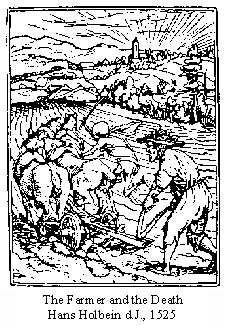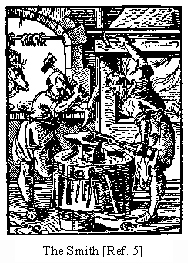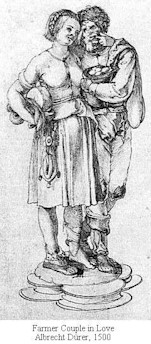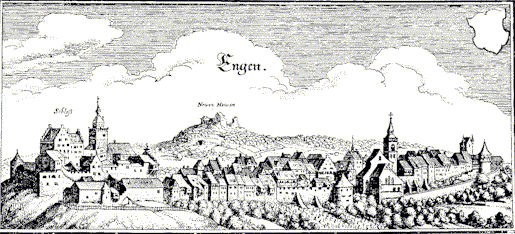A Brief Description of a Typical Southern German Village in the
Past Centuries
Dieter Joos
Ueberlingen, Germany
djoos@nikocity.de
August, 1999
Abstract
This article gives some insight to the life of Southern
German farmers in the past centuries.
The life of an individual was only partly concerned with obligations to the landlord or
the church. More than anything else the social class of the village into which
he/she was born determined the whole life. The knowledge about the basic rules of
the rural life in the past represents not a bad chance to reflect our own lifestyle from
an distant perspective. In any case however it is a great help for the ancestry
researcher.
Social Classes
 There were three village social classes
in the area that is now called Baden-Wuerttemberg, during the period 1500 to 1800, and
perhaps even to 1900.
There were three village social classes
in the area that is now called Baden-Wuerttemberg, during the period 1500 to 1800, and
perhaps even to 1900.
The first class consisted of wealthy farmers
(German=Bauer) (ca 2-5 %). They possessed the big farms. Generally, smaller parts of their
farm were owned by them and larger parts were obtained by fief (German= Lehen,
Schupflehen, Erblehen) from a landlord or the church or a monastery. Also, these farmers
occupied the important village positions, like Vogt (=Governor), village judge, etc.
The common farmers (ca 60-80 %) made up the second
class. They possessed land, also obtained by fief. These farmers worked hard, and usually
were able to have a modest standard of living for themselves and their families.
The third class consisted of the day laborers (German= Tageloehner, in Southern
Germany also called Seldner) (ca 20-40 %). They worked for the other farmers for day
wages. They were very, very poor and had many children, many of which died immediately
after their birth.
Occupations
Most of the farmers had a sideline profession that was usually handed down from
father to son.
Upper class: an occupation that brought in the most money: innkeeper.
Middle class: smith, cartwright, cooper, tailor, shoemaker, etc.
Lower class: weaver, ropemaker, tanner etc.
 There
was one profession, which has to be considered separately: the millers. Generally, they
were wealthy, often very rich, but also they had a very bad moral image. It was said that
they were not always honest (e.g., they would mix flour with sand or gypsum) and, they
were considered to be highly immoral. The last statement is based on the fact that the
mills were naturally located outside the village (towns: outside of the fortification
walls). It was at the miller’s location that events took place which the village
would not tolerate within its own walls (prostitution, gambling, excessive
drinking/partying) - (And alas, a considerable number of my ancestors were millers, but of
course, they were the exception to the rule!)
There
was one profession, which has to be considered separately: the millers. Generally, they
were wealthy, often very rich, but also they had a very bad moral image. It was said that
they were not always honest (e.g., they would mix flour with sand or gypsum) and, they
were considered to be highly immoral. The last statement is based on the fact that the
mills were naturally located outside the village (towns: outside of the fortification
walls). It was at the miller’s location that events took place which the village
would not tolerate within its own walls (prostitution, gambling, excessive
drinking/partying) - (And alas, a considerable number of my ancestors were millers, but of
course, they were the exception to the rule!)
The word "Bauer" (farmer) not only denoted the profession of a
farmer, but was also used as a title. A "Bauer" had to have at least two horses
and/or bulls and one plow. A wealthy first class Bauer had six or more horses and a net
worth of more than 1000 fl. (=guilders). On the other hand, a third class
"Tageloehner" possessed not much more than a cottage, a vegetable garden and
possibly, a goat and some chickens. In order to get a feeling for wealth and poverty, here
are some figures from ca. 1800: a good horse cost about 100 fl., a bull about 40 fl. and
an old cow 15 fl. The daily (12-hour day) wage for a "Tageloehner" was six
Kreuzer that is one tenth (!) fl.
 Marriages
Marriages
Before roughly 1820 marriage was allowed only with the permission of the
landlord. First of all, the engaged couple had to pay the lord for his permission (2-10
fl). Secondly, the couple had to prove to him and to the community that they would be able
to support themselves and their children without any outside help. A minimum net worth of
100 -200 fl. was required for marriage. Since many engaged couples could not come up with
this sum of money, a large number of the people remained unmarried. Illegitimate births
were a frequent occurrence. The parents of illegitimate children were punished heavily.
Both were subjected to a painful interrogation by the village judges and fined (the
maximum allowable fine was ca 12 fl). A worse fate was to be exposed publicly on Sunday in
front of the church, the woman with a straw garland on her head, the man, with a straw
sword at his side. Because of these difficult conditions, many emigrated to Hungary and
Russia (mainly before 1800) and to America (after 1800), usually not always asking the
lord for permission because he would require some remuneration (dozens of guilders).
Emigration
For the most part, emigrants were recruited from the middle and lower classes.
Often a family group put all their money together in order for one of their sons to
emigrate. They hoped that he would earn enough money in the New World to later pay for
their crossing. In many cases, this happened. Upper class people only emigrated when a
farm had been willed to one son (not too rare, the youngest one!) and this heir would give
his brothers some money to find a new existence outside the village.
Another social group for emigration consisted of those persons who were a
permanent burden to the community: e.g., extremely poor families, unmarried or widowed
women with children, violent persons and prisoners. In these cases, the community paid
partly or fully for the crossing. In 1884, the fee for Bremen-New York crossing was 80
Mark (equiv. 60 fl).
Names and Ancestor Research
An important consideration for family researchers is the fact, that marriage
between the classes was nearly impossible. At best, a mixing of classes only took place
after disasters like war or plague. The result of all this was that all families within
each class of a village and its neighboring villages as long as they belonged to the same
landlord were related. This is good for finding ancestor relatives , but bad for
identifying specific individuals because many persons had the same name (both first and
family names). Researchers must have in mind that before 1800 in the area of
Baden-Wuerttenberg were more than 100 tiny countys with jealous landlords . It was not
until 1806 that the Grandduchy of Baden and Kindom of Wuerttemberg were made by Napoleon.
In a typical Catholic village, two-third’s of all sons were named Johann
or Jakob and two-third’s of all daughters were named Maria or Anna. The rest were
named after saints, especially the local ones. Sometimes the children were named after the
landlord or infrequently, after the present or deceased sovereign provided he was
respected or beloved.
Here some very rough but nevertheless useful rules of thumb for first names
related to the sovereigns:
Baden: Burkhard, Bernhard, Friedrich, Hermann
Wuerttemberg: Ulrich, Eberhard
Bavaria (Bayern): Leopold, Ludwig, Max (Maximilian)
Village Government/Officials
 There
were rights for self-administration and self-jurisdiction of the villages. The head of the
village was the Vogt (=Governor). The lord selected him out of the members of the
community. Under him, two or three Buergermeisters (Mayors) were selected by the Gemeinde
(=community). Sometimes, communities owned considerable amounts of land and forest for
common use. Not infrequently, the community and the lord would have a quarrel on property
rights. What was troublesome for our ancestors proves to be a gold mine for today’s
ancestor researcher. I found very valuable information about my ancestors’ families
to ca. 1500, two hundred years before the parish records were introduced. In the case of
my ancestors, the lord felled trees in the community's forest. The community prosecuted
the lord at the Imperial Court of Justice. In the trial, not less than 27 witnesses
testified for both parties. In the court, they had to identify themselves and their
parents (that is, the gold mine of ancestor information!). The trial lasted for more than
10 years. Initially, the community had good chances to win the case, but in the end the
parties entered into a shaky agreement, which kept the quarrel alive for another 100
years.
There
were rights for self-administration and self-jurisdiction of the villages. The head of the
village was the Vogt (=Governor). The lord selected him out of the members of the
community. Under him, two or three Buergermeisters (Mayors) were selected by the Gemeinde
(=community). Sometimes, communities owned considerable amounts of land and forest for
common use. Not infrequently, the community and the lord would have a quarrel on property
rights. What was troublesome for our ancestors proves to be a gold mine for today’s
ancestor researcher. I found very valuable information about my ancestors’ families
to ca. 1500, two hundred years before the parish records were introduced. In the case of
my ancestors, the lord felled trees in the community's forest. The community prosecuted
the lord at the Imperial Court of Justice. In the trial, not less than 27 witnesses
testified for both parties. In the court, they had to identify themselves and their
parents (that is, the gold mine of ancestor information!). The trial lasted for more than
10 years. Initially, the community had good chances to win the case, but in the end the
parties entered into a shaky agreement, which kept the quarrel alive for another 100
years.
Final Note
What I described here is a very condensed picture of a German village in the
past centuries. It is typical for the areas in southern Germany. Other places in Germany
would be different in some aspects.

Engen, the central city of the Hegau county, by Mathäus Merian,
1640 ( http://www.engen.de/)
The city's contour has been preserved till now. At the foot of the landlord's castle is
the fenced in "Schloßmühle" (castle's mill) with the millwheel between two
buildings. Some of my ancestors were born and lived and died there.
References
For those readers who understand German, I'd like to give some references. Most
of the information for this paper I extracted from books from the serie Hegaubibliothek ,
edited by the "Verein für Geschichte des Hegaus" (Society for the History of
the Hegau County). Their address:
Verein für Geschichte des Hegaus
Schwarzwaldstr. 7
78224 Singen / Hohentwiel
Germany
1. Wolfgang Kramer, "Gottmadingen", Hegaubibliothek Bd. 101,
Gottmadingen, 1997, ISBN 3-921 413-67-2
2. Gertrud Streit, "Geschichte des Dorfes Rielasingen", Hegaubibliothek Bd. 82,
Singen, 1993, ISBN 3-921 413-34-6
3. Herbert Berner (Hrsg.), "Singen, Dorf und Herrschaft", Hegaubibliothek Bd.
55, Konstanz 1990, ISBN 3-87799-090-8
4. Rainer Kiewat, "Ritter, Bauern, Burgen im Hegau", Hegaubibliothek Bd. 46,
Konstanz 1986, ISBN 3- 7977-0144-6
5. Ferdinand Stemmer, "Orsingen, Geschichte eines Hegaudorfes", Hegaubibliothek
Bd. 33, Singen, 1977
6. Frieder Stöckle (Hrsg), "Handwerkermärchen", Fischer Taschenbuchverlag,
Frankfurt 1986, ISBN 3- 596-22866-2
Concerning the professions, as I am a lover of fairy tales I would recommend
highly thebooklet [6.], in the preface of which historical information on the
"ehrbaren" (honest) and "nicht ehrbaren" (non honest) trades can be
found. As a bonus, you will get some nice German fairy tales on about trades in past
times.
Acknowledgment
I would like to express my special thanks to Jack Lauber, West Chester, PA, USA
( Jlauber889@aol.com ) for his excellent
suggestions and for his great help with the editing of the article. Dieter Joos
© Dieter Joos, Überlingen, Germany